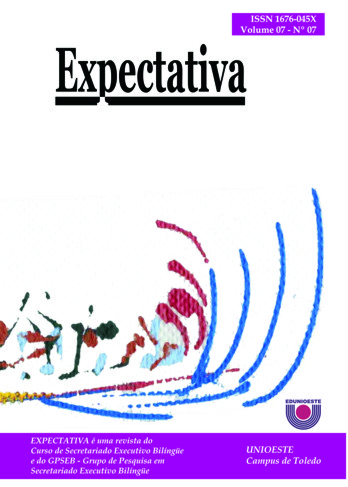AFFECTION AS AN ARGUMENT FOR FOREIGN LANGUAGE LEARNING OF THIRD AGE STUDENTS
DOI:
https://doi.org/10.48075/revex.v7i1.2853Keywords:
alunos da terceira idade, cognição, afetividadeAbstract
This research proposes a qualitative study of students ofthe third age in order to understand the role of affection in their foreign
language learning processes. Two groups of Brazilian third age students
studied English as a foreign language under the communicative approach,
having group 1 a focus in the development of the basic linguistic abilities
and group 2, a focus in learning through affection. The analysis of the
two learning situations have the objective of verifying the role of
affection, the way it comes in the interlanguage of the students, in the
activities developed in class, in the students’ needs and in the necessary
knowledge the teacher in such situation needs to handle as well as the
theories involved. The data suggest that an approach which interweaves
cognition and affection offers the most adequate learning situations for
old students of foreign languages.
Downloads
Published
10-02-2010
How to Cite
SARDO, C. E. AFFECTION AS AN ARGUMENT FOR FOREIGN LANGUAGE LEARNING OF THIRD AGE STUDENTS. Revista Expectativa, [S. l.], v. 7, n. 1, p. p. 109–123, 2010. DOI: 10.48075/revex.v7i1.2853. Disponível em: https://saber.unioeste.br/index.php/expectativa/article/view/2853. Acesso em: 24 dec. 2025.
Issue
Section
Artigos
License
Aviso de Direito Autoral Creative Commons
Política para Periódicos de Acesso Livre
Autores que publicam nesta revista concordam com os seguintes termos:
1. Autores mantém os direitos autorais e concedem à revista o direito de primeira publicação, com o trabalho simultaneamente licenciado sob a Licença Creative Commons Attribution que permite o compartilhamento do trabalho com reconhecimento da autoria e publicação inicial nesta revista.2. Autores têm autorização para assumir contratos adicionais separadamente, para distribuição não-exclusiva da versão do trabalho publicada nesta revista (ex.: publicar em repositório institucional ou como capítulo de livro), com reconhecimento de autoria e publicação inicial nesta revista.
3. Autores têm permissão e são estimulados a publicar e distribuir seu trabalho online (ex.: em repositórios institucionais ou na sua página pessoal) a qualquer ponto antes ou durante o processo editorial, já que isso pode gerar alterações produtivas, bem como aumentar o impacto e a citação do trabalho publicado (Veja O Efeito do Acesso Livre).
Licença Creative Commons
Esta obra está licenciada com uma Licença Creative Commons Atribuição-NãoComercial-CompartilhaIgual 4.0 Internacional, o que permite compartilhar, copiar, distribuir, exibir, reproduzir, a totalidade ou partes desde que não tenha objetivo comercial e sejam citados os autores e a fonte.


